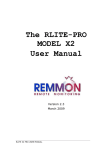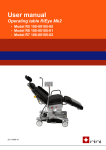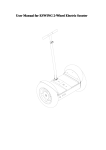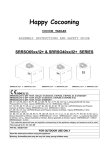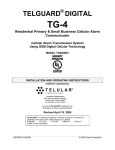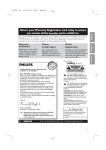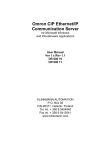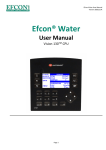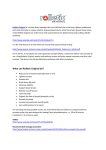Download The RLITE products MODEL X2 User Manual
Transcript
The RLITE products MODEL X2 User Manual Version 3.4 26 MAY 2009 RLITE products USER MANUAL RLite-X2 Table of Contents INTRODUCTION ..................................................................................................................................1 RLITE LED.........................................................................................................................................6 HARDWARE INSTALLATION ..........................................................................................................7 SIM CARD ............................................................................................................................................7 ANTENNA..............................................................................................................................................7 POWER SUPPLY CABLE .....................................................................................................................11 RELAY OUTPUT ...................................................................................................................................11 DIGITAL INPUT...................................................................................................................................12 ANALOG INPUT (ONLY AT 2A MODELS).............................................................................................12 THE APPLICATION SOFTWARE ...................................................................................................13 PROJECT.............................................................................................................................................13 Creating a New Project:.................................................................................................................13 Opening a Project: .........................................................................................................................17 Viewing a Project's Properties:......................................................................................................17 NEW USER(S) .....................................................................................................................................18 Adding a New User: .......................................................................................................................18 Changing/Deleting a User: ............................................................................................................18 WORKING WITH MEMORY FIELDS (TAGS).......................................................................................20 Default Tags: ..................................................................................................................................21 Adding a New Tag:.........................................................................................................................22 Analog inputs calibration (2A models)...........................................................................................23 Linear conversion and sensor calibration (AN1): ..........................................................................23 To carry out nonlinear transformation: .........................................................................................24 Changing/Removing a Tag:............................................................................................................25 WORKING WITH CONDITIONS ...........................................................................................................26 Adding a New Condition: ..............................................................................................................26 Attaching Values: ..........................................................................................................................29 Changing/Removing a Condition: ................................................................................................30 ASSOCIATING USERS AS CONDITION’S RECIPIENTS.........................................................................31 Selecting Condition’s Recipients: .................................................................................................31 RLITE-WEB MODELS ADVANCED SETTINGS ...................................................................................32 Selecting Channels and Logging Rate:.........................................................................................32 Defining Dispatch Tasks: ..............................................................................................................33 DOWNLOADING/UPLOADING.......................................................................................................34 CONNECTING WITH THE RLITE .......................................................................................................34 Defining a Connection: .................................................................................................................34 Remote Download: ........................................................................................................................35 Setting up the Cellular Modem: ....................................................................................................35 Establishing a Connection with RLITE Unit: ..............................................................................35 Downloading a Project:.................................................................................................................36 Uploading a Project:......................................................................................................................36 USING SMS TO COMMUNICATE WITH THE RLITE................................................................37 INQUIRIES...........................................................................................................................................37 DIRECTIVES........................................................................................................................................38 CONTACT INFORMATION .............................................................................................................39 RLITE products USER MANUAL RLite-X2 Introduction Thank you for purchasing Remmon RLite GSM/GPRS RTU system. Please read this guide carefully to ensure proper installation. Remmon is committed for providing the best cellular interactive monitoring solutions for your business. If you need further assistance, please contact Remmon Remote Monitoring at [email protected] or visit our web site at www.remmon.com. For all contact information, see page 39. Attention! • • Before using this product read carefully this manual. All examples and diagrams are intended to aid understanding, and do not guarantee operation. • Remmon Remote Monitoring accepts no responsibility for actual use of this product based on these examples. Please dispose of this product according to local and national standards and regulation. Only qualified service personnel should open this device or carry out repairs. • Warning: The RLITE is floating unit. Make sure that no connection between the RLITE unit and other electrical points. Failure to comply with appropriate safety guidelines can cause severe injury or property damage Do not attempt to use this device with parameters that exceed permissible levels. Do not install in areas with: excessive or conductive dust, corrosive or flammable gas, moisture or rain, excessive heat, regular impact shock or excessive vibration. Do not place in water or let water leak onto the unit. Do not allow debris to fall inside the unit during installation. 1 RLite-X2 THE RLITE X2 PRODUCT FAMILY The RLite X2 product family gives you variety of option to suit your needs, below a table that define all products: All models can be with one of two communication interface options: RS-232 or RS485. MODEL I/O NOTES RLITE X2 4 Digital Inputs 1 Relay Output RLITE X2 PRO 2A 2 Analog 4-20mA inputs 2 Digital Inputs 1 Relay Output RLITE X2 PRO 2O 2 Open Collector Outputs 2 Digital Inputs 1 Relay Output RLITE X2 WEB 2A * 2 Analog 4-20mA inputs 2 Digital Inputs 1 Relay Output RLITE X2 WEB 2O * 2 Open Collector Outputs 2 Digital Inputs 1 Relay Output RLITE X2 WEB 2C 4 Digital Inputs * 2 Counters connected to 2 of the DI 1 Relay Output Two nonlinear calibration table to both Analog inputs Not include nonlinear table The Counter increasing with any upraise of the DI. Table 1: RLITE models * The WEB option is refer to the log and server database option. NOTE: You can see the model type at the back of your device. 2 RLite-X2 Specification Description HW interfaces RS-232 / RS-485 One DB9 male (standard EIA) Analog Inputs See models table (page ) Digital Inputs/Output See models table (page ) Digital Output 1 (Relay 1A at 12-24V) Display 2 Leds (red, yellow) Physical Characteristic Dimension 104 X 67 X 33 mm Weight 200 gram Assembly 2 screw handles Power supply Specification Power supply 9-24VDC 1A Active current 100mA Stand by current 30mA Protection According to MIL-STD-704E Environment Operating Temperature -200C to 700C Storage Temperature -400C to 850C Operating Humidity 5% to 95% Protocols PLC protocols MODBUS, Unitronics, Microlog, Hostlink, Izumi and more… 3 RLite-X2 Description Specification Cellular Network Interface Band Two Band/ Tri Band/ Quad band Protocols CSD, SMS, GPRS class 10, Mobile station class B Internal modem Telit 864 Fully type approved according to R&TTE Modem Approvals CE, GCF, FCC, PCTRB, IC Technology GSM network + SIM card Internal antenna MMCX Antenna External antenna MMCX Analog input Specification (2A models) Number of input 2 Resolution bit 10 bit (0.02mA) Conversion speed 10mS Input Current 4-20mA DC Precision 2% (0.4mA) Input impedance 160Ω (10%) Digital input Specification 4 Number of input 2 (2A or 2O) Response time 20mS Minimum pulse width 1s Counter Specification (2C models) Number of Counters 2 (connect to Di1,Di2) Maximum counts up to 65535 pulses each counter Open Collector Output Specification (2O models) Number of input 2 Output type Open collector output Max current thru open collector 150mA 4 RLite-X2 Relay Output Specification Number of output 1 Output type Relay 1A/30VDC 0.5A/125VAC Max switching voltage/current 220VDC/1A 250VAC/1A Contact life cycle 200,000 operations minimum (contact rating) Minimum load 0.01mA/10mV Contact resistance or voltage drop up to 50mΩ Response time 3mS Data Logging (WEB models) Logger Memory 20KB Minimum Logging Interval 1 Minute Maximum Channels Sampling 10 Transferring Data Schedule Up to 5 tasks Transferring Data Destination REMMON website (private user login) Socket definition Compatible for DNS definition R-LITE Approvals : CE, RoHs compatible. 5 RLite-X2 RLITE LED RLITE contains two LEDs on the front panel. Table 2 describes the PWR LED indications. Table 1: PWR LED Indications Description Fast blinking, second Off State then 20 Initialization after reset Periodical Blinking: 2 seconds On, ½ second Off Empty database – No project in RLITE unit Periodical Blinking: ½ second On, 2 seconds Off Operational state Periodical Blinking: 1 second On, 1 second Off and 5 fast blinks Connection state with PC Fast blinking Sending SMS Periodical Blinking: 1 second On and 10 fast blinks. Pipe/Gateway state – Transferring data from PLC device to PC with cellular modem and vice versa. 6 RLite-X2 Hardware Installation SIM Card To send and receive an SMS, you need a valid SIM card. Insert the SIM card into the SIM slot on the back panel, as shown in Figure 1. Antenna Plug in the GSM antenna by connecting the MMCX plug into the ANT socket. Warning: The RLITE PRO is floating unit. Make sure that no connection between the RLITE PRO unit and other electrical points. 7 RLite-X2 Communication Port The RS232/485 port can either be used for connecting the RLITE to a PC or to a PLC. Using this port you can program the RLITE via your PC or you can read data from your PLC. To program the RLITE via a PC, you have to connect it to your PC thru the RS232/485 interface. NOTE: If you use the RS485 model you will need to use 485 to 232 converter. The RLITE X2 serial port communication is in one of 2 options: 232 or 485. The communication pins are described below. Socket Pin 232 ** 485 * Name Description Name 1 CD Carrier detect 2 RX Receive 3 TX Transmit + Data + 4 DTR Data Terminal Ready - Data - 5 GND Ground 6 DSR Data Set Ready 7 RTS Request To Send 8 CTS Clear To Send 9 RI Ring Indicator GND Description Ground * For 485 communication it's recommended to connect a 100Ω resistor between the (+) and (-) connectors. ** For 232 communication between RLITE and PLC, it's recommended to use adapter as described below. 8 RLite-X2 DB9 - Male to Male 3 wire Adapter: Note: The 6 remains pins are not connected! 9 RLite-X2 Cabling the R-LITE X2 I/O Cabling Analog inputs Model: PRO/WEB 2A Digital inputs cabling All models Cabling Open collector output Model: PRO/WEB 2O Back Panel Interface Front Panel Interface Power supply and relay output connector Relay output cabling 10 RLite-X2 Table 2:RJ12 Pin out Information Socket Pin MODEL RLITE X2(WEB) RLITE X2- PRO(WEB)- 2A RLITE X2- PRO(WEB)- 2O 1 NA ANALOG + ANALOG + 2 Din1 Analog input 1 (Ain1) Din1 3 Din2 Analog input 2 (Ain2) Din2 4 Din3 Digital input 1 (Din1) Open Collector output (OUT3) 5 Din4 Digital input 2 (Din2) Open Collector output (OUT2) 6 GND Ground(-) Warning: The RLITE X2 is floating device. Make sure that no connection between the RLITE X2 unit and other electrical points. Power Supply Cable Plug in the power plug into the power socket, as shown in Figure 1. Relay output The RLite comes with one relay output. Relay output can be activated or deactivated either by setting a predefined condition or by sending an SMS message from a recognized mobile phone. When the Relay output is in active state then poles A and B (at power connector, see figure) are connected. To use the relay output, follow these instructions: Disconnect the power cable from both sides (power and unit) Uncover the cable near the unit side connector. Cut the wire that bridge between pole A and B (see figure 1) The two wires are the two poles of the relay switch. 11 RLite-X2 Digital Input The RLITE is equipped with two Digital Inputs (Din 1/2) which can monitor dry contact sensors. The digital inputs are provided thru Din1/2 and GND (-) wires, see Information Table for RJ12 pin out. Digital input 1/2 (Din 1/2) are said to be in Active ‘1’ state if GND (-) and Din1/2 wires are connected, otherwise it said to be in Inactive ‘0’ state. Note: In the conditions statements, High and Low correspond to Active and Inactive states. Analog input (only at 2A models) The RLITE is equipped with two 4-20mA Analog Input. The sensor device can either get power from the RLITE or from external source. The 4-20mA current is to be converted into numeric values ranging from 0-65535 (0-FFFF Hex). The numeric value can be converted into engineering values in respect to preconfigured calibration, initiated by the user. 12 RLite-X2 The Application Software Project An RLITE project (or simply a project) is a computer file with an “rlt” extension. The RLITE application software can either create a new project or open an existing one. A project is the RLITE basic working environment. It is a platform, where you can edit your settings and download them to the RLITE. When the project is set it can be downloaded to the RLITE, thus configuring the RLITE behavior. Creating a New Project: To create a new project: 1. Click on File>New or click on the New project button The New project dialog box appears. Figure 1: New Project 2. In the name textbox, type in a name for your project, choose a directory path and click on Next. The Unit Definition dialog box appears. 13 RLite-X2 Figure 2: Unit Definition dialog-box 3. Fill in the fields as described in the following table. Table 2: Unit Definition Descriptions Field Description Unit Model Click on the down-drop-list to select your RLITE model. Use table 1:"RLITE models" and the label at the back of your device Unit phone Insert the unit phone number as ascribed to the SIM card in use. Description Note: To configure the RLITE unit via cellular modem, you must provide a valid phone number. Free text, describing your project. 4. Click on Next. If the unit model is RLITE-Web then Communication settings dialog box appears. If not then PLC and Communication Protocols dialog box appears. 14 RLite-X2 Figure 3: Communication Settings dialog box (only at Web models) 5. Fill in the fields, as described in the following table. Table 3: Communication Settings Field Descriptions Field Description APN context Connection string supplied by the cellular provider of the SIM card. The string must start and finish with quotation marks. User name Username supplied by the cellular provider of the SIM card. The string must start and finish with quotation marks. Password Password supplied by the cellular provider of the SIM card. The string must start and finish with quotation marks. Server socket Connection string supplied by your supplier. The string must start with the Socket number and then the IP string started and finished with quotation marks. [Default: 55123,"m2m.remmon.com"] 6. Click on Next. The PLC and Communication Protocols dialog box appears. 15 RLite-X2 Figure 4: PLC and Communication Protocol dialog box 7. Fill in the fields, as described in the following table. Table 4: PLC and Protocol Field Descriptions Field Description PLC Type Select PLC protocol Scan period Select the period of time between the PLC's data scans by the RLITE unit Baud Select baud rate for communication protocol with the PLC Parity Select Parity bit for communication protocol with the PLC DataLen Select Data length(Bits) for communication protocol with the PLC StopBits Select Stop Bit for communication protocol with the PLC 8. Click on Next. A confirmation window, summing configuration settings, appears. 9. Review your settings 10. Click on Finish. 16 all the project RLite-X2 Opening a Project: 1. Click on File>Open or click on the Open project button The Open project dialog-box appears. 2. Browse to the project directory, select your project and click on Open. Note: To reopen a project, go to the menu bar and click on File>"project name". Viewing a Project's Properties: To view your project properties: 1. On the menu bar, click on Project>Properties. 2. Click on Next >Finish. 17 RLite-X2 New User(s) Users are the cellular phone subscribers who can control and receive messages from the RLITE unit. To open the Users sheet page, click on the Users tab, on the vertical toolbar on the right of the screen. Figure 5: Users sheet page Adding a New User: 1. To add new user click on the Add button. The Add user dialog-box appears 2. Use the table below to set definitions for the new user. Table 5: User Descriptions Field Description User name The name of the user User Phone The phone number of the cellular phone to which messages are sent 3. Click OK. Note: You can add up to 16 users Changing/Deleting a User: You can either delete a user or change its properties. Deleting: Go to the Users sheet page, select the relevant user and click on Remove. 18 RLite-X2 Changing: Go to the Users sheet page, click on Change. In the Modify user dialog box, change the user name or phone. 19 RLite-X2 Working with Memory Fields (Tags) On the Memory page you can define I/Os, tags and other general purpose Bits which can be used as conditions within the RLITE or with other controllers. To open the Memory page, click on the Memory tab, on the vertical toolbar at the right of the screen. Figure 6: Tags List 20 RLite-X2 Default Tags: The Memory tab contains default tag names, assigning tags to the RLITE specifications, as described in the table below for model X2. The default Tags will appear according to your unit model that had chosen at the unit definition dialog box (page ) Table 6: Default Tags Tag Description Din1 Digital input 1 Din2 Digital input 2 Din3 Digital input 3 Din4 Digital input 4 AN1 Analog input 1 AN2 Analog input 2 VOL1 Nonlinear calibration for analog input 1 VOL2 Nonlinear calibration for analog input 2 C1 Counter 1 connect to Din1 C2 Counter 2 connect to Din2 OUT2 Open collector output 1 OUT3 Open collector output 2 OUT1 Relay output Time Time register Date Date register DayOfWeek Day of the week register PLC_COMM Communication regularity status: '0' for communication in order. '1' for communication abnormal Note: Make sure that your PC time and date clock is correct. When downloading, the RLITE clock automatically synchronized with your computer time and date clock. Also the RLite take clock from the cellular network any time the unit powered on. 21 RLite-X2 Adding a New Tag: 1. Click on the Add button. The Add tag dialog-box appears. 2. Use the table below to complete the dialog-box. Table 7: Tag Descriptions Field Description Name Tag's name which will be used for SMS feedback and reports Address Tag's address in the PLC Station PLC's Number Type Tag's type derived from protocol's properties Description General tag's description 3. Click OK for adding this tag to the memory map. The new tag appears in the memory map list. Note: You can add up to 100 tags. 22 RLite-X2 Analog inputs calibration (2A models) Linear conversion and sensor calibration (AN1): 1. Select the AN1/2 tag from the memory list. 2. Click change button (or double click on the table sheet). 3. At the change window click advanced button (at the bottom right side). 4. The advanced calibration window appears. Figure 7: Advance Calibration 5. The linear conversion is to be determined by mapping two different engineering values, one to the lower electric value (4 mA) and one to the upper electric value (20mA). 6. 1. At the upper textbox, insert engineering value. This value is to be mapped to the lower electric value (e.g. connecting sensor that 4ma goes to -20C, type -20). 2. At the lower textbox, insert engineering value. This value is to be mapped to the upper electric value (e.g. connecting sensor that 20ma goes to 100bar, type 100). While connected to unit, you can fine tune your calibration online by adjusting your linear conversion. The Current value display-box shows the current engineering value online with respect to your linear conversion. The new calibration takes effect after Data download. 23 RLite-X2 To carry out nonlinear transformation: Non Linear transformation refers to linear sensors that measuring non-linear values (e.g. liquid level sensors corresponding to cylinder tank volume) 1. Select the VOL1/2 tag from the memory list. 2. Click change (or double click on the table sheet). 3. At the change window click advanced 4. The table window appears. Figure 8: Conversion Table 5. For any calibration point click on new row 6. Insert the sensor’s electric output value, ranging from 4-20mA, and its corresponding engineering value. 7. Repeat steps 5 and 6 to complete the conversion table. 8. To edit a row click on modify row 9. You can load existing table by clicking on load table 24 RLite-X2 Changing/Removing a Tag: 10. Select the relevant Tag from the memory list. 11. Click Change or Remove button. Note: You cannot change or remove a system's default tags. After you define, add or remove new tag, download the updated project information to the RLITE unit (refer to Downloading or uploading a project) 25 RLite-X2 Working with Conditions Setting conditions allows you to configure the behavior of your RLITE on a given event. It is a logical mechanism through which you can specify events that will trigger sending an SMS. You also specify the recipient of the SMS, if output relay is going to be opened/closed, and more. To set a new condition, as well as modify an existing one click on the Conditions tab, on the vertical toolbar on the right of the screen. The Condition sheet page will appear. Figure 9 : The Condition sheet page Adding a New Condition: 12. Click on the Add button the Add condition dialog box appears. 26 RLite-X2 Figure 10: Condition Definition 13. Use the table below to set your condition. Table 8: Conditions Field Description Logical condition The logical expression, which determines when a warning is sent to the specified users. The expression consists of a Tag, operator, and a specific value (its type depends on the selected I/O type). I/O The I/O on which the condition is based. Note: The I/O drop down list contains some other items you may use as condition’s base (i.e.-time). Operator The operator of the logical expression. Possible values: =Equal to the specific value. > Greater than the specific value. < Less than the specific value. <> Not equal to the specific value. 27 RLite-X2 Value Select the value in the logical expression, its type and selection form depends on the selected I/O type Send SMS on alarm On Select SMS on alarm on for sending SMS in case of event/condition occurrence Send SMS on alarm Off Select SMS on alarm off for sending SMS in case of event's status inversion. SMS text Type text that is sent to the specified users cellular phones. 14. For advanced properties click on the Advanced button. The Advanced properties dialog-box appears. Figure 11: The Advanced dialog-box 15. Use the table below to complete the Advanced dialog-box. 28 RLite-X2 Table 9: Advanced Properties Field Description Stability time The amount of time during which the condition’s logical expression must be 'true' before an SMS is sent. Send it: xx times The number of times the message will be sent to each recipient. Every :xx:xx The time passed between sending the messages. Out 1 Relay output activation by condition: Open for open relay contact. Close for relay contact. Wait stability time Mark this option in order to wait stability time. Attaching Values: To select any additional value(s) to be sent to your cellular phone with the text for this condition: 1. Click on the Attach Values tab Figure 12: SMS Report 29 RLite-X2 2. Click the value Name. A mark will appear next to the value, and the value will also appear in the Selected list. The Cellular screen window simulates how the condition message with its values will be displayed on your cellular phone. (The ### marks the parameters value digits). 3. Click on OK. The new condition appears in the Conditions List. Note: After defining a condition, you must associate users as recipients for the condition (refer to Associate users as conditions). Note: After you defining conditions, download the updated project information to the RLITE. Changing/Removing a Condition: If you no longer want RLITE to send warnings for a particular condition, you can delete the condition from the project. 1. Select the relevant condition from the Conditions list. 2. Click on Change or Delete button. Note: After you changing or deleting any condition, you must download the updated project information to the RLITE (refer to Downloading Data to an RLITE). 30 RLite-X2 Associating Users as Condition’s Recipients Recipients are the selected users that receive the conditions' SMS. Each condition may have its own selected recipients. Figure 13: Recipients Screen Selecting Condition’s Recipients: To reach the Recipient's screen, 3. Click on the Recipient's tab on the vertical toolbar. 4. Click the check box under the recipient's name which corresponds to the specific condition (Click again to uncheck it) Note: After you select a condition’s recipients, download the updated project information to the relevant RLITE (refer to Downloading Data to an RLITE). 31 RLite-X2 RLITE-Web models Advanced Settings The Web tab allows you to configure the sample rate, the channels to be logged, and the interval to dispatch the data into the web server. Figure 14: Web Screen Selecting Channels and Logging Rate: To reach the Web screen, 1. Click on the Web tab on the vertical toolbar (appears only if the project belongs to the Web type). 2. Select the logging rate using the up/down buttons in the Logging Definitions box at the top of the screen. The minimum rate is 1 minute. 3. Click on the channel name to be logged at the RLITE-Web. To deselect the channel, click on the channel name again. Note: The RLITE-Web supports only 10 channels to be logged. 32 RLite-X2 Defining Dispatch Tasks: Dispatch task is a periodical event for sending data to the web server. To define a Dispatch task, 1. Click on the Add button. The Scheduled Tasks dialog box appears. Figure 15: Scheduled Tasks dialog box 2. Select the task performing periodicity and follow the on-screen instructions. 3. Click on Finish to complete the task setting. Note: The RLITE-Web models supports up to five scheduled tasks. Note: Confirm that the RLITE-Web date and time are accurate, because the Scheduled Tasks feature relies on this information to run scheduled tasks. 33 RLite-X2 Downloading/Uploading Connecting with the RLITE To upload or download a project, you must define your connection with the unit via the serial port of your PC or via a cellular modem. Note: Ensure that the RLITE hardware is properly connected Defining a Connection: 1. Click on Project > Connection or click on the Setting button A Communication settings window will pop up Figure 16: PC Communication settings 2. Select a communication method. If the communication is via serial port: • Select Via serial option • Select the correct serial port from the drop-down box • Select your port settings • Click on OK If the communication is via modem: • Select Via Modem option 34 RLite-X2 • Select Modem from the drop-down box • Click on OK Remote Download: To support communication between RLITE software and the RLITE unit, a cellular modem needs to be connected to the PC that is running RLITE software. Note: Ensure that both the RLITE’s SIM and the PC’s modem’s SIM cards support CSD communication. Note: If the RLITE’s SIM and the PC modem’s SIM are from different cellular service providers, use the DATA-IN number (the phone number for using the CSD) as the RLITE number in the RLITEs list on the Project Main screen. Your cellular service provider should enable the SIM cards for CSD, and inform you of their DATA-IN number. Setting up the Cellular Modem: Before installing the cellular modem in your PC, insert the SIM card into the modem so that the modem can transmit and receive data via the cellular network. For instructions regarding installation of the SIM card, refer to the modem’s documentation. The modem is connected to the PC with a 9 pin D-shell cable. To connect the modem to the PC: 1. Connect the female end of the 9 pin D-shell cable to the PC that is running RLITE SOFTWARE 2. Connect the male end of the cable to the cellular modem. Establishing a Connection with RLITE Unit: 1. Click on the Users tab on the vertical toolbar to open the Users List screen. 2. Enter your password. Note: For the initial connection to the RLITE unit, enter the default password: 000000 (six zeros) 3. Click the Connect button 35 RLite-X2 4. Wait a few seconds. A green RUN indicator on the bottom left- of the screen will confirm your connection. Note: After establishing connection, you can change the password by typing a new six letter password and clicking on the Change password button Downloading a Project: After designing a project you must download the project to the RLITE unit. Note: Before downloading a project, make sure you have established a connection with the RLITE unit. 1. Click the Download button 2. Wait a few seconds till the download process is completed. Note: After making changes to the project, it must be downloaded to the RLITE unit to become valid. Uploading a Project: Warning: Uploading data prom the RLITE unit to an open project will erase all previous data on that project!!! In order to upload a project from the RLITE unit you must open a project. 1. Click New project or open an existing one. 2. Click Upload button 3. Wait a few seconds till the upload process is completed. 36 RLite-X2 Using SMS to communicate with the RLITE After a successful download you can put the RLITE into work. Only users, which had been defined in the RLITE configuration settings, can communicate with the RLITE. A typical RLITE user can either get warning SMS messages from the RLITE or send inquiry/directive SMS messages to the RLITE. Inquiries With the RLITE in the field, you can check for the current value of each of its Tags. Each user, defined in the RLITE configuration, can send an inquiry SMS message with the following format: ?<Tag's name>, Note: You may concatenate in one SMS, more than one request in the following format. ? <tag name-1>,<tag name-2>, Examples: To get the current time of the RLITE, send an SMS message to the RLITE SIM card number with the following text: ?Time, To get the time and date of the RLITE, send an SMS message with the following ftext: ?Time,Date, To get the current value of digital input 1, send an SMS message with the following format: ?<the name of digital input 1>, The default name for digital input 1 Tag is Din1; during RLITE configuration one may rename some or all of the Tags. If the default name of digital input 1 hasn't been renamed, then a user may get its current value by sending an SMS message with the following text: ?Din1, Note: The Header in SMS must be exactly like the header as configured at software, include capital letters if there is. 37 RLite-X2 Directives With the RLITE in the field, you can change or reset each of its Tags. Each user, defined in the RLITE configuration settings, can send a directive SMS message with the following format: !<tag's name>=<value>, Note: After RLITE sets the new value, a notification message is sent to your cellular phone. Note: You may concatenate in one SMS, more than one set command in the following format. !<Text-1>=<value-1>,<Text-2>=<value-2>, Examples: To set the RLITE time to a specific hour, a user can send an SMS message to the RLITE SIM card number with the following format: !Time=HH:MM, To set the time to 16:30 the user should send SMS message to the RLITE Sim card number containing the following text: !Time=16:30 To set the RLITE date to a specific date, a user can send an SMS message to the RLITE SIM card number with the following format: !Date=dd.mm.yy, To set the date to August 11 2007 one should write !Date=11.08.07, If it is now August 11 2007 and the time is 16:30, then one can set the time and date by sending the following SMS text: !Time=16:30,date=11.08.07, To turn on the output relay, send an SMS message with the following format: !<the name of the relay output>=1, The default name for the output relay Tag is Out; during RLITE configuration one may want to rename some or all of the Tags. If the default name of the relay output hasn't been changed, then one may turn it on by sending the following SMS text: !OUT=1, Alternatively, to turn off the relay output send the following SMS text: !OUT=0, 38 RLite-X2 Contact Information Address: Industrial Area – Beit She'an, Israel, 10800 Email: [email protected] Phone: 972-4-6065815 Fax: 972-4-6065819 Website: www.remmon.com 39









































